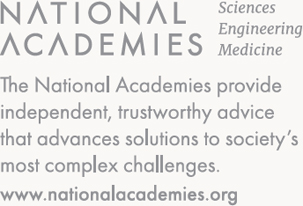 |
Proceedings of a Workshop—in Brief |
Addressing Bioterrorism in a Changing Scientific and Security Context
Abbreviated Version of a Proceedings of a Workshop—in Brief
The National Defense Authorization Act for Fiscal Year 2021 requested the National Academies of Sciences, Engineering, and Medicine (National Academies) “to conduct an assessment of strategies of the United States for preventing, countering, and responding to nuclear, biological and chemical terrorism; and to make recommendations to improve such strategies.” The National Academies has convened three projects to respond to this Congressional mandate: a consensus study on countering radiological and nuclear terrorism, a consensus study on countering chemical terrorism, and a workshop series on countering biological terrorism. The objectives of the countering bioterrorism workshop series were:
- Discuss policy and technical capabilities for forensics and attribution of biological incidents of unknown or questionable origin, including current scientific capabilities and their limitations at determining whether the incidents were human-made.
- Explore current and future threats of mis- and disinformation campaigns that contribute to challenges toward prevention, detection, and accurate distribution of biological terrorism incidents.
- Identify gaps in policies and programs for addressing biological terrorism based on lessons learned from the pandemic and other biological incidents, and awareness about actor capabilities, motivations, and resources.
On November 29, 2022, the National Academies of Sciences, Engineering, and Medicine held the second of two workshops in this series. The overall goal of the second, classified workshop in this series focused on the current policy landscape and outstanding needs for countering bioterrorism within the changing threat and risk contexts. The workshop’s specific objectives were:
- Understand whether and how bioterrorism risk and threat assessments are affected by advances in research involving biological agents, life sciences and biotechnology developments, and mis- and disinformation.
- Evaluate current capabilities and future needs for assessing and attributing bioterrorism incidents involving biological agents, life sciences and biotechnology developments, and mis- and disinformation.
- Identify policy and programmatic needs for countering bioterrorism given the current and future policy, operational, and threat landscapes.
The outcomes of the discussion were summarized in a classified Proceedings of a Workshop—in Brief.
DISCLAIMER This Proceedings of a Workshop—in Brief was prepared by Kavita Berger, Steven Moss, and Alan Shaw as a factual summary of what occurred at the workshop. The statements made are those of the rapporteur(s) or individual workshop participants and do not necessarily represent the views of all workshop participants; the planning committee; or the National Academies of Sciences, Engineering, and Medicine.
WORKSHOP PLANNING COMMITTEE MEMBERS Jacqueline Fletcher (Chair), Oklahoma State University; Denise N. Baken, Shield Analysis Technologies; Rita R. Colwell, University of Maryland; Asha George, Bipartisan Commission on Biodefense; Margaret E. Kosal, Georgia Institute of Technology and Savannah River National Laboratory; Erik Prentice, 6th Floor Insights; Ronald Schouten, District of Columbia Department of Behavioral Health and St. Elizabeth’s Hospital.
REVIEWERS To ensure that it meets institutional standards for quality and objectivity, this Proceedings of a Workshop—in Brief was reviewed by Seth Carus, National Defense University; J. Patrick Fitch, Los Alamos National Laboratory; Asha George, Bipartisan Commission on Biodefense; and Ranée Rotter, National Counterterrorism Center. Elisabeth Reese, National Academies of Sciences, Engineering, and Medicine, served as the review coordinator.
STAFF Kavita Berger, Board on Life Sciences; Steven Moss, Board on Life Sciences; Alan Shaw, Intelligence Community Science Board; Christl Saunders, Board on Life Sciences.
SPONSOR This workshop was supported by the U.S. Department of Defense.
SUGGESTED CITATION National Academies of Sciences, Engineering, and Medicine. 2023. Addressing Bioterrorism in a Changing Scientific and Security Context: Abbreviated Version of a Proceedings of a Workshop—in Brief. Washington, DC: The National Academies Press: https://doi.org/10.17226/27246.
|
Division on Earth and Life Studies Copyright 2023 by the National Academy of Sciences. All rights reserved. |
 |


